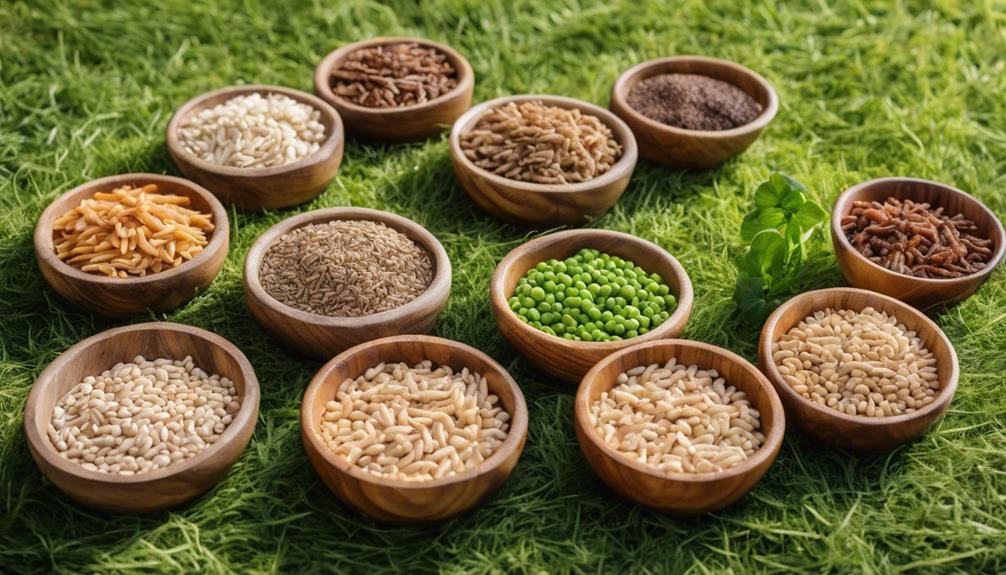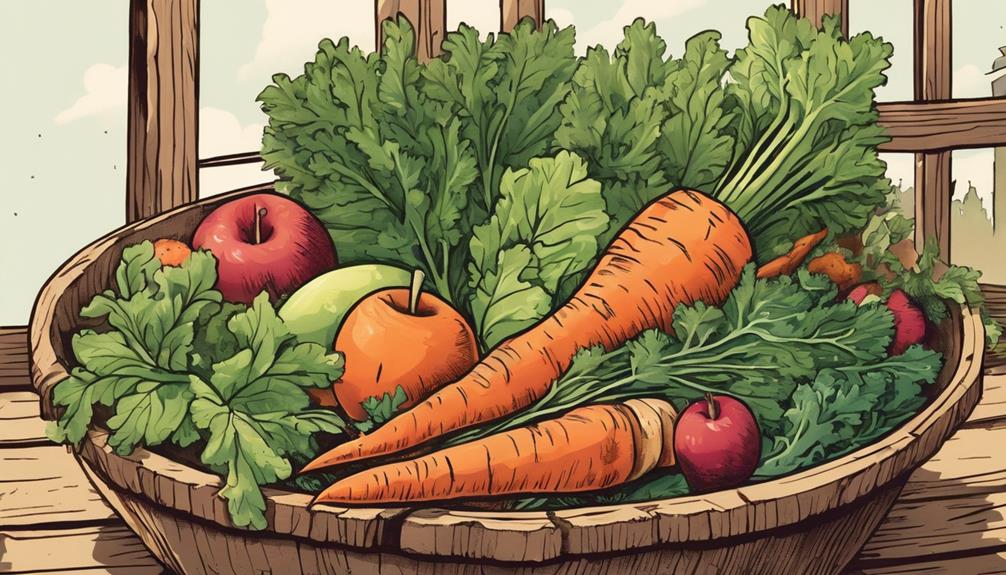Just as a well-tended garden yields a bountiful harvest, a carefully planned diet ensures your backyard chickens thrive. You've likely noticed the difference in your flock's vitality when they're fed a balanced diet versus scraps alone.
These 7 vital tips we're about to explore are your tools for cultivating robust health in your chickens, from the right mix of grains and proteins to the essentiality of grit and greens. But before you scatter that next handful of feed, consider how these practices can transform not just their health, but the quality of the eggs on your breakfast table.
Why stop now when your chickens' peak wellness is just within reach?
Key Takeaways
- Select feed based on chickens' age, breed, and purpose to meet nutritional needs.
- Supplement diets with calcium and greens for stronger eggshells and overall health.
- Incorporate quality protein sources like soybean and fish meal for optimal growth.
- Practice safe feeding by avoiding toxic foods and maintaining coop hygiene.
Balanced Feed Selection
Why not ensure your chickens thrive by choosing a balanced feed that meets their specific nutritional needs? Selecting the right chicken feed is crucial for the health and productivity of your backyard chickens. A balanced diet, rich in protein, vitamins, and minerals, supports overall health, growth, and egg production.
You'll find that layer feed is perfect for your egg-laying hens, packed with the necessary nutrients to keep them healthy and productive. On the other hand, broiler feed is formulated for chickens raised for meat, focusing on rapid growth while maintaining muscle health. Remember, the feed should match your chicken's age, breed, and purpose to ensure they're getting exactly what they need.
Always opt for feeds labeled as complete and balanced. These products are designed to meet all your chickens' nutritional requirements without the need for additional supplementation. However, if you're unsure which feed is best for your flock, don't hesitate to consult a poultry specialist or veterinarian. They can offer personalized feed recommendations, ensuring your backyard chickens lead a happy and healthy life.
Supplementing With Greens
Incorporating greens like lettuce, kale, and spinach into your chickens' diet can significantly boost their health by providing essential vitamins and minerals. These greens not only contribute to the overall well-being of your backyard flock but also improve the nutritional value of their eggs. You'll notice the egg yolks becoming richer in color, a sign of enhanced nutrition.
To integrate greens effectively into their diet, consider the following strategies:
- Continuous Growth: Protect your green feed from being completely devoured by your chickens. This ensures a steady supply of fresh greens. Using a barrier system or elevated planters can keep the plants out of reach, allowing them to grow back.
- Sprouting Greens: Sprouting seeds like alfalfa, clover, or even the greens themselves, can provide an additional nutrient boost and add variety to their diet. It's a healthy option that's relatively easy to manage.
- Diverse Selection: Offering a variety of greens supports your chickens' health more comprehensively. Mix things up with different types of lettuce, kale, and spinach to ensure a balance of essential vitamins and minerals.
Proper Protein Levels

Ensuring your chickens' diet includes the right protein levels is crucial for their growth, feather quality, and egg production. Protein isn't just a part of their diet; it's the backbone of their health and productivity. Different breeds of chickens have varying needs for protein, making it essential to select feed that caters to these requirements. High-quality sources like soybean meal, fish meal, and insect protein are excellent choices to ensure your hens are getting the nutrients they need.
Monitoring your chickens' protein intake is key. Too little protein can lead to poor muscle development and reduced egg production, while too much can cause health issues. To help you keep track, here's a table of protein sources and their benefits:
| Protein Source | Benefit | Ideal For |
|---|---|---|
| Soybean Meal | High-quality protein | Growth & Egg Production |
| Fish Meal | Rich in essential amino acids | Feather Quality |
| Insect Protein | Sustainable & nutritious | Overall Health |
Seasonal Diet Adjustments
After understanding the importance of protein in your chickens' diet, it's crucial to also consider how their nutritional needs change with the seasons. As the year progresses, your feathery friends require diet adjustments to maintain their body condition and achieve optimal health.
Here's how you can adapt their diet:
- Winter Months: Boost the feed's calorie and nutrient content to provide extra warmth and energy. This helps them stay cozy and active despite the cold.
- Molting Season: Ramp up the protein content significantly. Chickens shed and regrow their feathers during this time, and a protein-rich diet supports healthy feather regrowth, ensuring they don't lose too much body condition.
- Spring and Summer: Introduce a variety of greens, fruits, and vegetables. This not only mimics their natural foraging behavior but also adds excitement to their diet. Additionally, consider supplementing calcium intake in the fall, especially for laying hens, to promote strong eggshells.
Throughout these seasonal shifts, keep a close eye on your chickens' weight and body condition. Adjust feeding amounts as necessary to keep them in tip-top shape year-round. This proactive approach ensures they always have access to the nutrients they need, when they need them.
Safe Kitchen Scraps

As you consider incorporating kitchen scraps into your chickens' diet, it's crucial to know which ones are safe and beneficial. You'll need to steer clear of toxic foods like citrus, onions, and avocado, which can harm your feathered friends.
Focusing on suitable vegetable scraps and avoiding dangerous items will ensure your chickens enjoy a varied and nutritious diet without any health risks.
Suitable Vegetable Scraps
When it comes to feeding your backyard chickens, incorporating a variety of safe vegetable scraps, like leafy greens, carrots, cucumbers, and zucchini, can significantly enhance their diet. These kitchen scraps not only offer nutritional diversity but also help in maintaining a balanced diet for your chickens. Remember, moderation is key to avoiding digestive issues.
To paint a clearer picture, consider these safe options:
- Leafy Greens: These are packed with vitamins and are easy for chickens to peck at.
- Carrots: Both the roots and greens are safe and provide a crunchy treat.
- Cucumbers: High in water content, they're perfect for hydration on hot days.
Always ensure the vegetable scraps are fresh, clean, and free from mold to keep your chickens healthy and happy.
Avoiding Toxic Foods
While incorporating a variety of vegetable scraps into your chickens' diet offers many benefits, it's crucial to know which foods to avoid to keep them safe and healthy. Never feed chickens toxic foods such as avocado, chocolate, onions, garlic, and raw beans. These can harm their health significantly.
Instead, focus on safe kitchen scraps that contribute to a balanced nutrition profile. Fruits like apples, berries, and melons, along with vegetables such as carrots, cucumbers, and leafy greens, are excellent choices. Cooked grains, rice, and pasta also make suitable additions.
However, remember to limit treats and scraps to 10% of their diet to ensure they're getting the nutrients they need from their primary feed.
Grit for Digestion
To ensure your backyard chickens digest their food properly, they'll need to peck at grit, such as shell grit, which plays a crucial role in their gizzard's function. This specific type of grit does more than just aid in the breakdown of food; it's a multifaceted component of your chicken's diet that provides essential benefits. Here's a quick snapshot:
- Digestive Health: Insoluble grit like shell grit acts as a natural grinder inside the chicken's gizzard, helping to break down food particles. This process is vital for their overall digestion and nutrient absorption.
- Calcium Boost: Shell grit offers a significant source of calcium, which is crucial for laying hens. The calcium content helps in forming strong and healthy eggshells, ensuring that your hens can produce eggs safely and efficiently.
- Hygiene and Cleanliness: Regularly replacing the shell grit in your chicken's diet helps maintain a clean and hygienic eating environment. Ensuring the grit is clean and fresh prevents the build-up of waste and bacteria, promoting a healthier flock.
Regular Health Checks

Just as ensuring a diet rich in essential nutrients like calcium is vital for your backyard chickens, so too is conducting regular health checks to monitor their well-being. Regular health checks are your frontline defense in spotting early signs of illness. This involves closely observing your hens for any lethargy, abnormal droppings, or unexpected changes in their behavior.
Good health indicators to look for include bright red combs, clear eyes, and healthy-looking skin. These signs suggest your chickens are thriving. However, don't overlook the importance of a thorough foot inspection. Checking the feet for any cuts, scrapes, or signs of parasites is crucial for preventing infections that could affect their overall health.
If you notice a hen appears unwell, it's essential to take prompt action. This may include isolating her from the rest of the flock to prevent the spread of potential diseases. Moreover, boosting your chickens' immune system through a balanced diet, incorporating natural remedies, and providing appropriate care are proactive steps towards ensuring their long-term health. Remember, maintaining the health of your backyard chickens is a commitment that requires regular attention and care.
Conclusion
To ensure your backyard chickens thrive, it's crucial you follow these seven tips.
Offer them a balanced diet, supplement with greens, and ensure they're getting enough protein.
Don't forget to adjust their diet with the seasons and introduce safe kitchen scraps for variety.
Grit is essential for their digestion, and regular health checks will keep them in top shape.
By taking these steps, you're not just feeding them; you're giving them the foundation for a healthy, happy life.